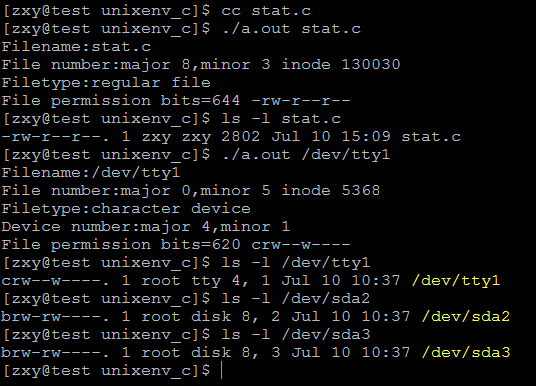linux系统编程之文件与IO(五):stat()系统调用获取文件信息
一、stat()获取文件元数据
stat系统调用原型:
#include <sys/stat.h>
int stat(const char *path, struct stat *buf);
int fstat(int fd, struct stat *buf);
int lstat(const char *path, struct stat *buf);
帮助信息可通过:man 2 stat 查看
DESCRIPTION
These functions return information about a file. No permissions are
required on the file itself, but — in the case of stat() and lstat() —
execute (search) permission is required on all of the directories in
path that lead to the file.
stat() stats the file pointed to by path and fills in buf.
lstat() is identical to stat(), except that if path is a symbolic link,
then the link itself is stat-ed, not the file that it refers to.
fstat() is identical to stat(), except that the file to be stat-ed is
specified by the file descriptor fd.
All of these system calls return a stat structure, which contains the
following fields:
struct stat {
dev_t st_dev; /* ID of device containing file :该文件所属设备的设备号,设备号包括主设备和和次设备号,dev_t是16位整数,高8位表示主设备号,低8位表示次设备号*/
ino_t st_ino; /* inode number */
mode_t st_mode; /* protection :包含文件访问权限信息及文件类型*/
nlink_t st_nlink; /* number of hard links */
uid_t st_uid; /* user ID of owner */
gid_t st_gid; /* group ID of owner */
dev_t st_rdev; /* device ID (if special file):如果该文件是特殊文件即设备文件,则表示设备号 */
off_t st_size; /* total size, in bytes */
blksize_t st_blksize; /* blocksize for file system I/O */
blkcnt_t st_blocks; /* number of 512B blocks allocated :分配的块数量*/
time_t st_atime; /* time of last access */
time_t st_mtime; /* time of last modification */
time_t st_ctime; /* time of last status change:如修改文件的权限 */
};
文件类型有两种方式获得:
1.通过以下的一些宏进行验证:m为struct stat中得st_mode字段
S_ISREG(m) is it a regular file?
S_ISDIR(m) directory?
S_ISCHR(m) character device?
S_ISBLK(m) block device?
S_ISFIFO(m) FIFO (named pipe)?
S_ISLNK(m) symbolic link? (Not in POSIX.1-1996.)
S_ISSOCK(m) socket? (Not in POSIX.1-1996.)
2.利用struct stat中得st_mode字段与S_IFMT进行与运算:mode&S_IFMT,然后将得到的结果与下列的常量比较,相等就是
The following flags are defined for the st_mode field:
S_IFMT 0170000 bit mask for the file type bit fields
S_IFSOCK 0140000 socket
S_IFLNK 0120000 symbolic link
S_IFREG 0100000 regular file
S_IFBLK 0060000 block device
S_IFDIR 0040000 directory
S_IFCHR 0020000 character device
S_IFIFO 0010000 FIFO
文件访问权限获得:利用struct stat中得st_mode字段与S_IFMT进行与运算:mode&S_IFMT,然后将得到的结果与下列的常量比较,相等就是
S_IFMT 0170000 bit mask for the file type bit fields
S_ISUID 0004000 set UID bit
S_ISGID 0002000 set-group-ID bit (see below)
S_ISVTX 0001000 sticky bit (see below)
S_IRWXU 00700 mask for file owner permissions
S_IRUSR 00400 owner has read permission
S_IWUSR 00200 owner has write permission
S_IXUSR 00100 owner has execute permission
S_IRWXG 00070 mask for group permissions
S_IRGRP 00040 group has read permission
S_IWGRP 00020 group has write permission
S_IXGRP 00010 group has execute permission
S_IRWXO 00007 mask for permissions for others (not in group)
S_IROTH 00004 others have read permission
S_IWOTH 00002 others have write permission
S_IXOTH 00001 others have execute permission
示例程序:
#include <unistd.h> #include <sys/stat.h> #include <sys/types.h> #include <sys/stat.h> #include <fcntl.h> #include <stdlib.h> #include <stdio.h> #include <errno.h> #include <string.h> #define ERR_EXIT(m) \ do \ { \ perror(m); \ exit(EXIT_FAILURE); \ } while(0) #define MAJOR(a) (int)((unsigned short)a >> 8) //高8位:主设备号 #define MINOR(a) (int)((unsigned short)a & 0xFF)//低8位:次设备号 int filetype(struct stat *buf); void fileperm(struct stat *buf, char *perm); int main(int argc, char *argv[]) { if (argc != 2) { fprintf(stderr, "Usage %s file\n", argv[0]); exit(EXIT_FAILURE); } struct stat sbuf; printf("Filename:%s\n", argv[1]); if (lstat(argv[1], &sbuf) == -1) ERR_EXIT("stat error"); printf("File number:major %d,minor %d inode %d\n", MAJOR(sbuf.st_dev), MINOR(sbuf.st_dev), (int)sbuf.st_ino); if (filetype(&sbuf)) { printf("Device number:major %d,minor %d\n", MAJOR(sbuf.st_rdev), MINOR(sbuf.st_rdev)); } char perm[11] = {0}; fileperm(&sbuf, perm); printf("File permission bits=%o %s\n", sbuf.st_mode & 07777, perm); return 0; } int filetype(struct stat *buf) { int flag = 0; printf("Filetype:"); mode_t mode; mode = buf->st_mode; switch (mode & S_IFMT) { case S_IFSOCK: printf("socket\n"); break; case S_IFLNK: printf("symbolic link\n"); break; case S_IFREG: printf("regular file\n"); break; case S_IFBLK: printf("block device\n"); flag = 1; //该文件为设备文件 break; case S_IFDIR: printf("directory\n"); break; case S_IFCHR: printf("character device\n"); flag = 1; break; case S_IFIFO: printf("FIFO\n"); break; default: printf("unknown file type\n"); break; } return flag; } void fileperm(struct stat *buf, char *perm) { strcpy(perm, "----------"); perm[0] = '?'; mode_t mode; mode = buf->st_mode; switch (mode & S_IFMT) { case S_IFSOCK: perm[0] = 's'; break; case S_IFLNK: perm[0] = 'l'; break; case S_IFREG: perm[0] = '-'; break; case S_IFBLK: perm[0] = 'b'; break; case S_IFDIR: perm[0] = 'd'; break; case S_IFCHR: perm[0] = 'c'; break; case S_IFIFO: perm[0] = 'p'; break; } if (mode & S_IRUSR) perm[1] = 'r'; if (mode & S_IWUSR) perm[2] = 'w'; if (mode & S_IXUSR) perm[3] = 'x'; if (mode & S_IRGRP) perm[4] = 'r'; if (mode & S_IWGRP) perm[5] = 'w'; if (mode & S_IXGRP) perm[6] = 'x'; if (mode & S_IROTH) perm[7] = 'r'; if (mode & S_IWOTH) perm[8] = 'w'; if (mode & S_IXOTH) perm[9] = 'x'; perm[10] = '\0'; }
运行结果:
以下是man手册上的一个示例:
#include <sys/types.h> #include <sys/stat.h> #include <time.h> #include <stdio.h> #include <stdlib.h> int main(int argc, char *argv[]) { struct stat sb; if (argc != 2) { fprintf(stderr, "Usage: %s <pathname>\n", argv[0]); exit(EXIT_FAILURE); } if (stat(argv[1], &sb) == -1) { perror("stat"); exit(EXIT_SUCCESS); } printf("File type: "); switch (sb.st_mode & S_IFMT) { case S_IFBLK: printf("block device\n"); break; case S_IFCHR: printf("character device\n"); break; case S_IFDIR: printf("directory\n"); break; case S_IFIFO: printf("FIFO/pipe\n"); break; case S_IFLNK: printf("symlink\n"); break; case S_IFREG: printf("regular file\n"); break; case S_IFSOCK: printf("socket\n"); break; default: printf("unknown?\n"); break; } printf("I-node number: %ld\n", (long) sb.st_ino); printf("Mode: %lo (octal)\n", (unsigned long) sb.st_mode); printf("Link count: %ld\n", (long) sb.st_nlink); printf("Ownership: UID=%ld GID=%ld\n", (long) sb.st_uid, (long) sb.st_gid); printf("Preferred I/O block size: %ld bytes\n", (long) sb.st_blksize); printf("File size: %lld bytes\n", (long long) sb.st_size); printf("Blocks allocated: %lld\n", (long long) sb.st_blocks); printf("Last status change: %s", ctime(&sb.st_ctime)); printf("Last file access: %s", ctime(&sb.st_atime)); printf("Last file modification: %s", ctime(&sb.st_mtime)); exit(EXIT_SUCCESS); }






